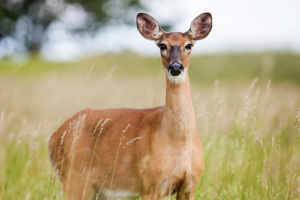They just come out of nowhere sometimes. That’s true. Sometimes there’s nothing you can do to avoid colliding with a deer on the road. They often hop or run – onto a curvy road – in the dark – and they never look both ways. There are a few things you can do to help your chances out there and we also have some tips on what to do if you find yourself in this unfortunate situation.
 During the months of October through December is when we see the most cars come in to the shop for repair after hitting a deer. It’s deer season – the deer population rises and as a result, there are more deer on the roads and higher deer-vehicle collisions. According to Insurance Information Institute (III), one out of 167 drivers will have a claim from hitting a deer, elk, moose or caribou in 2018. Those odds more than double between October and December. More than half a million car-deer collisions occur each year and according to DeerCrash.org, these collisions kill an average of 200 people per year.
During the months of October through December is when we see the most cars come in to the shop for repair after hitting a deer. It’s deer season – the deer population rises and as a result, there are more deer on the roads and higher deer-vehicle collisions. According to Insurance Information Institute (III), one out of 167 drivers will have a claim from hitting a deer, elk, moose or caribou in 2018. Those odds more than double between October and December. More than half a million car-deer collisions occur each year and according to DeerCrash.org, these collisions kill an average of 200 people per year.
The best thing to do to better your chances is to be extra vigilant especially in high risk areas, dates and times. Focus on the following:
- Be especially watchful at dusk and dawn (peak hours)
- Keep an eye out in deer-crossing zones, usually near agricultural fields and forestland
- If you see one, expect more since they usually move in groups
- Use high beams at night; the light illuminates their eyes
- If you see one, slow down and blow your horn to scare it away
What if you’re about to hit a deer?
Brake firmly with both hands on the wheel and stay in your lane. Do not swerve! It seems wrong, but accidents actually worsen when people swerve out of their lanes to avoid the deer. Drivers often go into oncoming traffic, collide with another car, crash into a tree or run off the road ending up in much worse accidents.
If you hit a deer
If you hit a deer, call 9-1-1 or the police directly. If your car is mobile, pull your car in front of oncoming traffic, with your hazard lights on, to block the deer from other cars hitting it. Do not touch the deer. An injured or scared animal can hurt you or further injure itself. Once the police arrive, fill out an accident report to file with insurance. The police will call the proper authorities to take care of the animal.
Deer accidents are typically covered by insurance under comprehensive coverage. If you’re one of the unlucky ones to be involved in a car vs. deer accident, come see us. We have extensive experience in working on these specific types of repairs and we know how to work directly with your insurance. Call us at 914-962-3879 and we’ll walk you through the process.




